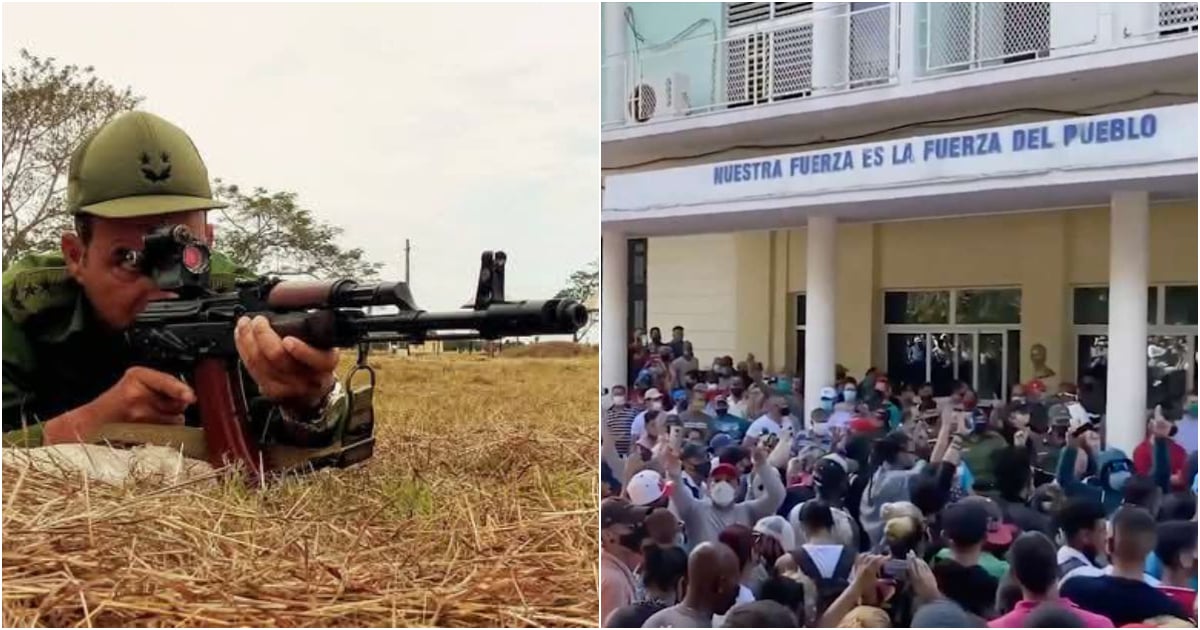Four years after the historic social upheaval on July 11, 2021, the largest demonstration against the Cuban regime in over six decades, the Revolutionary Armed Forces (FAR) have made their presence known. Through official social media channels, the Eastern and Western Armies have broadcasted messages filled with militant rhetoric and political triumphalism, reaffirming their loyalty to the regime while making it clear that dissent will not be tolerated.
The Eastern Army declared on Facebook this July 11, "We will never be defeated, we will never surrender," accompanied by slogans such as "we have a brave and dignified people" and "a people who raise the lone star flag and do not kneel," using the hashtag #CubaEstáFirme. Rather than acknowledging those who died, were imprisoned, or went into exile following the historic uprising, the military forces prioritize their allegiance to the so-called Revolution and align themselves with the Communist Party.
The Western Army echoed these sentiments. Through videos and multiple Facebook posts, they affirmed their readiness to "defend the homeland with resolve, bravery, and dignity," while promoting their "invincibility" and portraying themselves as guardians of peace—on their own terms. The narrative that the FAR are an integral part of the populace is repeated, despite evidence from July 11 indicating that repression was perpetrated by those who claim to protect the citizenry.
Ignoring the Root Causes
The military insists on themes of "sacrifice" and "loyalty," yet fails to address the root causes of the protests: economic desperation, lack of freedom, and ongoing repression. There is no mention of the hundreds detained, including minors, nor the summary trials and severe sentences that followed. Instead, the message this July 11 is clear: the military apparatus remains intact, mobilized, and committed to suppressing any dissent. Rather than fostering dialogue, the FAR adhere to their usual script.
On the fourth anniversary of July 11, the government instructed institutions to post politically reaffirming messages on social media with the hashtag #CubaEstáFirme. However, many Cubans are convinced that the regime is weaker than ever and its end may be near. During the day, Cuban leader Miguel Díaz-Canel tweeted that "Cuba is firm because we are a people who know how to fight; because we have the spirit of the cimarrones and mambises; for being children of a Revolution made through intelligence and courage."
International Response and Commemoration
While the Cuban government dismissed the legitimacy of the July 11 protests, claiming they were orchestrated from the United States, the day marked an unprecedented display of citizen bravery, which was brutally repressed following Díaz-Canel's televised order to "combat." Exiled Cubans and freedom activists are holding an informational event and demonstration in Madrid to commemorate the fourth anniversary.
Earlier this year, the Miami International Film Festival premiered Cuba’s Eternal Night, a gripping documentary showcasing the island's humanitarian crisis, repression, and mass exodus following the July 11 and 12 protests. Over 66 minutes, the film follows five Cubans over two years as they face governmental repression, food and medicine shortages, and the largest mass exodus the island has ever seen.
Repression and Its Aftermath
To quell the protests across numerous Cuban towns and cities, Díaz-Canel's regime employed violent repression and arbitrary arrests, including of minors. This was followed by swift and oppressive trials that violated due process, resulting in long and unjust sentences. During the crackdown, 36-year-old Diubis Laurencio Tejeda was shot dead by police while participating in a peaceful protest in Havana's La Güinera neighborhood on July 12, marking the only confirmed fatality.
Another protester, Osiris Puerto Terry, was shot by regime forces during the demonstration in Toyo, in the Diez de Octubre municipality. The government's wave of repression against July 11 demonstrators resulted not only in mass imprisonments but also in a tragic toll, including the deaths of at least four political prisoners in custody. These incidents highlight the inhumane conditions in Cuban prisons, medical neglect, and systemic abuse against those who dared to demand freedom in a country where dissent is harshly punished.
The organization Prisoners Defenders and other human rights groups report that the Cuban regime continues to hold 1,150 political prisoners, most detained for protesting against Díaz-Canel's government. In January 2025, the Havana regime announced the release of 553 individuals due to international pressure and the decision of former U.S. President Joe Biden's administration to remove Cuba from the list of state sponsors of terrorism.
Following initial releases, the process stalled for over a month, but in March, the vice president of Cuba's Supreme People's Court stated the procedure concluded "successfully," divided into two phases: 378 requests approved in January and 175 in February. Human rights organizations have criticized the Cuban regime for inflating release figures by mixing political prisoners with common inmates, noting that many released were already eligible for parole or open regimes months prior.
Activists emphasize that hundreds of prisoners of conscience remain in Cuban jails, with those released still under surveillance and restrictions. Meanwhile, the regime warns that non-compliance with imposed conditions could lead to re-imprisonment at any time.
Frequently Asked Questions about Cuban Military Repression
What was the significance of the July 11 protests in Cuba?
The July 11 protests in 2021 were the largest demonstrations against the Cuban regime in over sixty years, signaling widespread discontent with economic hardships, lack of freedoms, and ongoing repression.
How did the Cuban regime respond to the July 11 protests?
The Cuban regime responded with violent repression, mass arrests, and harsh sentences, including against minors, to suppress dissent and maintain control.
What is the current state of political prisoners in Cuba?
As of recent reports, the Cuban regime holds approximately 1,150 political prisoners, many of whom remain incarcerated due to their opposition to the government.
